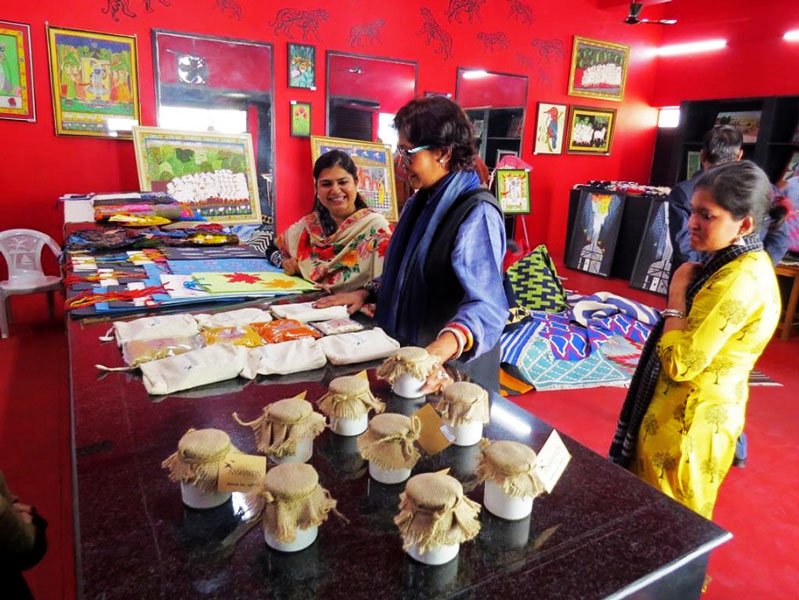The Jaipur Central jail has evolved into a complete sudhar ghar (correctional home) with the Rajasthan government undertaking a unique and innovative measure to transform the lives of the jail’s inmates by imparting them professional skills associated with the rich cultural heritage of the State.

The result is Aashayein, the Jail Shop, which was inaugurated by Rajasthan Chief Minister Vasundhara Raje Scindia in January 2017.
The first-of-its-kind prison shop in Rajasthan stocks artefacts crafted under guidance from master craftsmen, those knowledgable in the art, NGOs, renowned designers from the textile industry such as Martand Singh, painter/artist Yashwant Shrivastav, great fashion designers such as Bibi Russell from Bangladesh, designer duo Abraham and Thakore and professors from the National Institute of Design, Ahmedabad.

When Bibi Russell visited the shop, she was fascinated with the outfits designed by the prisoners and assured the jail authorities that she will help in providing a platform to the detenues through the internationally acclaimed Jaipur Heritage Week celebrated every year.
The most important factor that distinguishes Aashayein from other similar initiatives is its location right outside the jail premises in the city market. The items are designed by almost 2,500 men and women prisoners of not only the Jaipur Central Jail but also the Bhilwara, Ajmer, Jodhpur and Udaipur jails.
Gulab Chand Kataria, Rajasthan’s Home Minister, said the sole reason behind Aashayein was to keep the inmates occupied and help them earn a secure livelihood. “The products showcased in the shop are designed by those prisoners who are sentenced for over seven years imprisonment. Many of them are undergoing a life term. The revenue generated is used for the welfare of the convicts. Earlier, these detenues, after a whole day’s hard work, managed to earn barely Rs 20 as their daily wages. But, through Aashayein, where the monthly sale is over Rs 1 lakh, these prisoners are now getting Rs 130–180 a day. The money is directly deposited in their bank accounts.”

This earning gives them a feeling of security and enhances their self-respect too as they can give something to their families, he said.
Added Ajit Singh, DG, Prisons, “Earlier, the products designed by the detainees were purchased only by the government departments as the quality was a big issue.” But gradually the quality of the products was improved and their sales picked up when the products were marketed to the general public through the well-designed shop, done by Malvika Singh, a member of CM Raje’s advisory council.
These prisoners are getting training in painting, artworks, rug-making, weaving, furniture crafting, and wood work. Jodhpur and Udaipur jail detainees are proficient in sheet-metal products and can make coolers, almirahs and other metal items.
This craft will now be taught to the Jaipur jail inmates too.
The good news for the inmates is that by virtue of their good conduct and showing involvement in making these products, they can get remission in their term from four days to three months. Later, they also have the chance to shift to open jails, where the products they have learnt can be made for bulk supply.
Kataria said this initiative has built a positive image of the jail authorities among the public and generated a feeling of compassion for the prisoners.
Goodies on offer
The jail shop has two sections, one where quilts, bedspreads, tablecloths, lehengas, tote bags, skirts, tie and dye dupattas, napkins, pickles, spices, pots, envelopes and handmade paper bags crafted by women inmates are displayed. In the other section, products such as furniture, coolers, wall paintings, rugs etc made by the male prisoners have been showcased. A special touch is inmates doing colourful wall paintings on front wall of the jail shop, adding a sense of cheer to the place. Also, these days they design their prison clothes.

The products are moderately priced with the cost ranging from Rs 10 for an envelope to Rs 10,000 for a wall painting of Shri Krishna. The most popular products are wall paintings, rugs and furniture.
Organic vegetables grown by the prisoners are also in demand. Shankar Singh, Superintendent of the jail, said in the last one year, the inmates have grown over 190 quintals of organic vegetables and these are used in their food too.
True to its name, Aashayein is bringing a new ray of hope in the life of prisoners, and equipping them with some precious skills. The good news, adds DG Ajit Singh, is that “in a short span of six months due to great response from the public the State government is planning to start a replica of such shops in other central jails too.”
Even better, with this jail shop generating interest in both the traditional and social media, domestic as well as foreign tourists are placing bulk orders in advance. And sometimes the demand overtakes the produce; particularly in items like furniture, clothes and paintings.
The writer is a Rotarian from RC Jaipur, D 3054.





